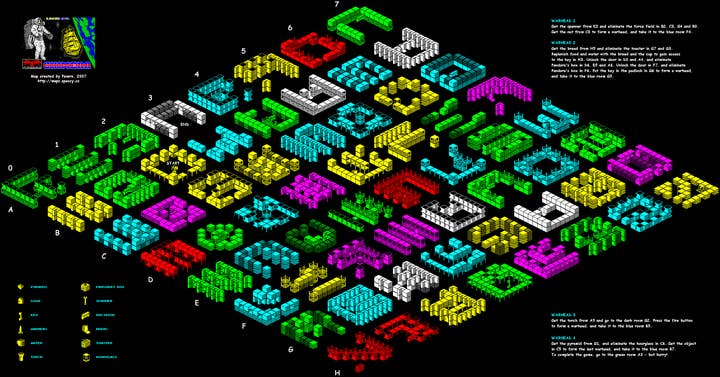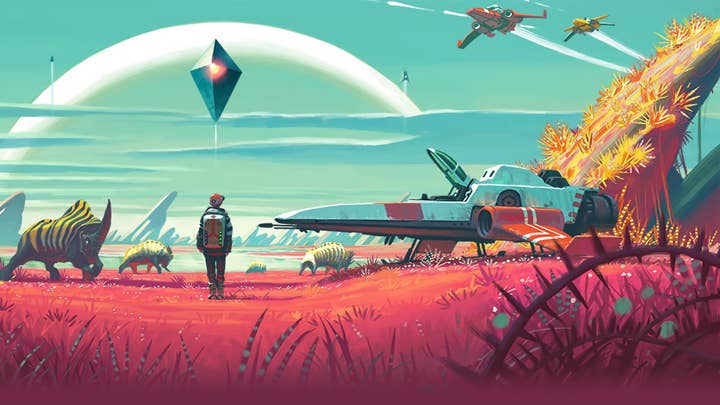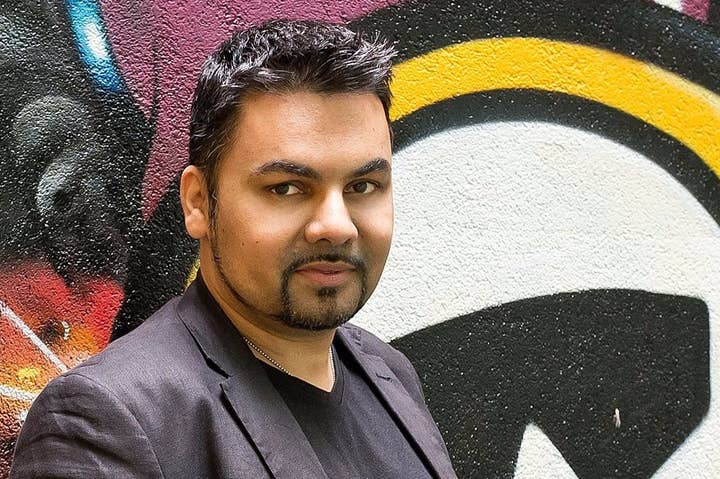"I want to go back to the thing I was born to do”
Shahid Ahmad on leaving "the best gig in video games" at PlayStation to embrace the uncertainties of life as an indie developer
Shahid Ahmad is at war with "We." Speaking on a panel at Casual Connect Europe, PlayStation's former indie figurehead slips time and again into the same familiar phrasing. Whenever he talks about Sony Computer Entertainment, the company at which he worked for a decade, any pretense that his departure last year represented a true separation quickly disappears. When Ahmad talks about PlayStation, even in the future tense, he still says, "We."
"Just about everywhere else I ever worked, once I'd left I felt detached from my previous employer," Ahmad tells me when we meet after his panel, the platform for a frank assessment of the challenges he too faces now he has returned to independence. "PlayStation wasn't like that. I identified so strongly with PlayStation, especially over the last four years that I was there. That's unlikely to ever go away.
"It's perfectly natural. Let's face it, I didn't leave on bad terms. I left on great terms. It's not like I went to a competitor. It wasn't an industry move. It wasn't a power play."
"I left Sony on great terms. It's not like I went to a competitor. It wasn't an industry move. It wasn't a power play"
Perhaps the most confounding aspect of Ahmad's departure was the fact that he decided to do it in the first place. In all of his time working with the brand, PlayStation has never looked as healthy and diverse as it does right now. And with PlayStation VR due to launch later this year, Sony stands an excellent chance of becoming the market leader in what could be a revolutionary new era for the games industry. Ahmad left what he admits is, "probably the best gig in video games," to enter a world so full of uncertainty that some have taken to describing it in apocalyptic terms.
Not that Ahmad needs to be educated on indie development in 2016, of course. He was, after all, one of the most public figures in PlayStation's drive to create a console where the needs of indies would be a strategic imperative. Indeed, it was in reaching out to and working with those developers that awoke an essential part of his character. "I left because I don't know how long I've got," he says, "and I want to go back to the thing I think I was born to do."
That's a romantic way to put it, but the risks involved in leaving, "the best gig in video games," obliterate any suspicion of insincerity. The fact is that Ahmad has been coding games for longer than I have been playing them, self-publishing his first project on the Spectrum in 1982. "It was rubbish," his Linkedin profile notes drily, before mentioning that he also worked on the Commodore 64 version of Jet Set Willy. "It sold a million. I got £4k. I was young." Ahmad wasn't quite as young when he left the independent life behind around 25 years ago, but he was, by his own admission, "scared."
"I got scared that I couldn't carry on doing it as one person, and I'd need to build a team," he says. "I wasn't interested in building up a team."

Ahmad made a clean break from that independence in the early Nineties, and any notion that his introverted nature would weaken his ability to function in a team proved unfounded. Indeed, what actually happened seems to be a beneficial inversion of the "Peter principle." Rather than Ahmad's abilities earning him new responsibilities to which he wasn't suited, he was instead surprised by his own capacity for leadership.
"That was a skill I didn't realise I had. In the '90s I was leading teams, and then here I led a small team." Ahmad pauses, then shakes his head. "'Here.' See? I'm at it again. At PlayStation I led a small team. That, for me, was as important as the work I did with developers."
"There I am, this tired, defeated, bitter, cynical old fart, thinking that I'm just gonna see out my days as a cog in a machine"
And leading that small team at PlayStation is the main reason that I'm talking to Ahmad now. Indeed, he can recall the exact day that he recognised the allure of independence once again: March 2009, on a visit to the British developer Honeyslug. Ahmad was looking for content for PlayStation Minis, a series of small downloadable titles for the PSP, and a great fit for Honeyslug's creative, experimental Flash games.
"I thought making games and creativity were pretty much brain-dead at that point, that it was just a sausage factory," he says. "It wasn't the love and the passion that we used to have in the '80s, and part of the '90s as well. I thought that had gone, and then I visited Honeyslug.
"I hope I didn't give off too much of the holier-than-thou, 'We're PlayStation, we know what we're doing,' kind of crap. I probably did. I probably smelt of corporate really badly back then, but I was looking for something and they had it. It was idea after idea after idea.
"There I am, this tired, defeated, bitter, cynical old fart, thinking that I'm just gonna see out my days as a cog in a machine. I'd organised this meeting for early afternoon so I could get off home early. I'm going home at seven o'clock, absolutely buzzing. I thought, 'Maybe there's still hope for me. Maybe there's a chance.'"
That meeting shifted Ahmad's attention to the freedom that indies had found in the digital age. Braid, Castle Crashers and World of Goo had all launched on digital platforms in 2008, receiving both critical acclaim and head-turning sales. The iOS App Store was gathering momentum in its first full year of existence, and Steam was about to eclipse 25 million registered users. It was the start of what Ahmad describes as a, "six-year sidetrack of building up a whole indie business," with PlayStation Minis leading into PlayStation Mobile, and PlayStation Mobile leading into the prominence of indie games on PlayStation Vita.
"I got to sign No Man's Sky, you know? I made the deal happen, but how much of a tease was that?"
"I was in the centre of it to begin with, but it was still on the fringe for PlayStation," Ahmad says. "Then it became more central and more central and much more important. Suddenly it was a strategic imperative, and before I know it I'm involved in just about everything related to indie development as it touches PlayStation."
The early success of PlayStation 4 owed a great deal to Microsoft's ill-advised decisions about the positioning of the Xbox One, and a handful of smart reactions from Sony's management team. In fact, one could quite reasonably make the argument that the tight embrace of indie games was the most powerful strategic idea that originated within PlayStation itself. It underlined the perceived gap between Sony and Microsoft in terms of attitude, while simultaneously masking a "sparse" and uneven first-party software line-up. Ahmad was integral to that process, but the fact that his advocacy and diligent effort had paid off so handsomely couldn't mask his true feelings.
"I don't think I ever changed on the inside," he says. "I wanted to be close to what these people were doing in a way that I wasn't at PlayStation. There was always that separation. It was deeply fulfilling to help make these things come to life, and I thought, 'That's it. I want to do the same again.'
"I got to sign No Man's Sky, you know? I made the deal happen, but how much of a tease was that? As someone with coding in his bones, the work Hello Games was doing was just the ultimate."

However, Ahmad is quite clear that returning to independence is not about measuring up to the indie games that now seem so essential to PlayStation 4 - The Witness, Firewatch and, yes, No Man's Sky. It is simply about becoming immersed in the creative process that his time at Sony only allowed him to nurture and encourage. The fact that his name is so closely associated with those very games has not escaped his notice, of course, and I suggest that his public persona - built on an admirably open attitude towards social media platforms like Twitter - could be a significant advantage in a market where the single biggest issue facing indie developers is being noticed in the first place.
"Well, there's a good side and a bad side to that," he replies. "Yes, obviously it would be great to use that. The bad side? Boy, I had better deliver, because if I don't I only have that one shot before people go, 'Yeah, he tried his indie thing and he made a complete pig's ear of it. Where is he now?' That's the downside. The upside is maybe I get a bit more attention if I do something cool... but only if I do something cool."
"I made a really big decision, and I need to make sure I get it right. I haven't got time to muck around"
Right now, Ahmad is committed to tackling the early stages of his new career alone. His personal blog is packed with frank insights on the choices he made, on staying motivated now his life is free of imposed structure, and on the obvious joy he has found in reconnecting with a passion that laid dormant for so long. He understands that someone with his reputation and experience could assemble a talented team in short order, but the decision to start small was deliberate.
"Just to make sure that I'm doing the right thing, and to start at a reasonable point," he explains. "To be realistic about what I'm capable of as a single person, and then to grow that.
"I've got ideas about what I want to do for games two, three, four, five. I've got 20 years' worth of ideas backlogged, and now there's VR in the mix, too. Ideas won't be a problem. The problem will be making sure that I apply the right amount of resources at the right time and make a cool enough game.
"I'm getting on a bit. My time is limited, so I have to be focused. I made a really big decision, and I need to make sure I get it right. I haven't got time to muck around."
GamesIndustry.biz is a media partner for the Casual Connect conference. Our travel and accommodation costs were provided by the organiser.

